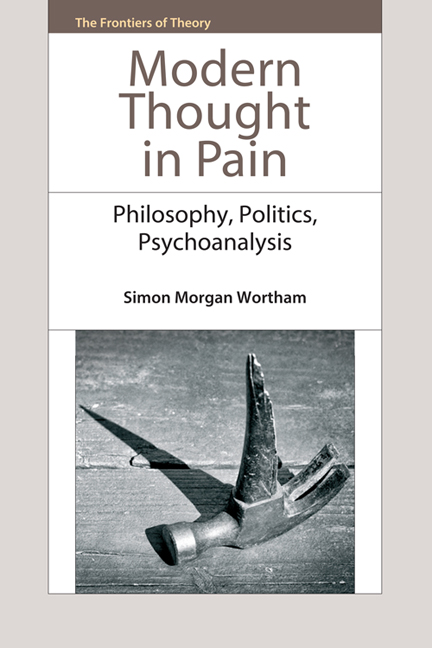1 - After Pains
Published online by Cambridge University Press: 05 September 2016
Summary
Nachkriege: Ernst Jünger's ‘On Pain’
In the period after the First World War, the sense of extreme national humiliation that resulted in a historical experience of Nachkriege or ‘afterwar’ on the part of the German Right, in particular, took the form not only of a mortifying sense of loss but, perhaps as its further radicalisation, a refusal to accept the war's ending. (‘Afterwar’, then, can be read in a double and contradictory sense.) As we shall see, in ‘Theories of German Fascism’, which reviewed the work of Ernst Junger, Walter Benjamin argues that this tendency to continually relive the last war, to permanently inhabit its milieu, not only prevented Germany from accepting and capitalising on loss (as Benjamin believed had happened in Russia). Through a particular aestheticisation of politics, the deep repressions characterising this climate of ‘lost war’ also funded a disastrous misconstrual of the stakes and conditions of the next one. It is in this context of Nachkriege, then, that the rise of an ultra-conservative reactionary modernism can be understood, as the broader yet somewhat distinct backdrop for the specifically Hitlerian form that German fascism took. Such reactionary modernism mobilised itself, as Peter Osborne has observed, on the strength of a specific temporal structure defined by the ‘conjunction of a backward-looking politics’, on the one hand (in Junger's case, a politics based on the vision of a soldierly heroism wholly at odds with the values of progressive liberalism, representative government, individual freedom, security, convenience and comfort that he saw as responsible for the crisis of European modernity), and, on the other, ‘an affirmation of technology’ that was futurally oriented, and indeed imbued with a warlike destiny. Of the different forms this reactionary modernism took, during the 1920s and early 1930s Junger developed an ultra-austere vision of an anti-democratic worker-state based on soldierly discipline, order and sacrifice. At the heart of this was placed the transformative capacity of modern technology, closely allied to a cult of war which desired total and permanent mobilisation as the basis of a radically new social form.
- Type
- Chapter
- Information
- Modern Thought in PainPhilosophy, Politics, Psychoanalysis, pp. 21 - 38Publisher: Edinburgh University PressPrint publication year: 2014



